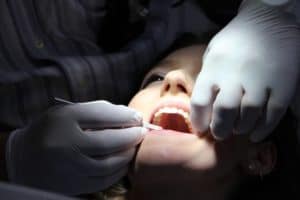Anxiety surrounding simple medical procedures is actually quite common, especially when it comes to dental visits. An estimated 9% – 15% of Americans admit to anxiety or fear surrounding dental exams or procedures and as a result, tend to avoid dental visits altogether, putting themselves at a higher risk for poor dental health and more dental health problems.
Fortunately, there are many easy solutions for easing dental anxiety or phobia that will help make dental visits much easier to handle, that range from conscious sedation techniques to something as simple as having an open dialogue about fears and concerns with your dental healthcare professional. Dental anxiety or phobia is nothing to be embarrassed about, and with the wealth of options available to help improve or calm your experience, it’s important to be able to talk openly about your concerns and find the best fit for you.
What Is Dental Anxiety?
The two most common issues surrounding dental exams are dental anxiety and dental phobia. While the two terms are commonly used interchangeably, they are actually quite different.
Dental Anxiety
Dental anxiety is the most common and least detrimental of the two, and most people with anxiety surrounding dental procedures still make it to the dentist but feel uncomfortable with even a quick examination. Dental anxiety is quite common among most adults and tends towards a general sense of uneasiness, making it difficult for patients to relax and bringing to mind many exaggerated concerns.
In order to determine if dental anxiety is present, it’s important to know the symptoms and how they tend to manifest the most commonly.
Top dental anxiety symptoms include:
- A sense of uneasiness or dread surrounding a dental visit or exam
- Exaggerated concerns and fears that make it difficult for them to relax or think about anything else
- Tenseness or irritability in the exam chair, leading to jitters and unfocused thoughts
Dental Phobia
Dental phobia is a far more serious condition than dental anxiety, causing intense fear and dread, and often results in sufferers never even making it to the dentist at all. People who suffer from dental phobia aren’t merely anxious — they can actually become panic-stricken and report feeling absolutely terrified. Some even make themselves ill with fear in the waiting room after forcing themselves to go.
Unfortunately, as a result of such intense mental discomfort, dental phobia leads to higher instances of tooth and gum disease since people with this disorder tend to avoid dental visits altogether, and can even lead to other problems, such as self-consciousness surrounding their poorer dental hygiene. Symptoms of dental phobia will vary from person to person, but there tend to be several common ways that this mental disorder manifests itself.
Top dental phobia symptoms include:
- Extreme tenseness and trouble sleeping the night before a dental appointment
- The sense of having to physically force yourself to go to the dentist and even being upset enough to want to cry at the thought of a dental exam
- Increasing nervousness and irritability in the waiting room
- Some adults even report such mental discomfort that they become physically ill before or during a visit
- Extreme panic when dental tools or objects are placed in or around the mouth during the visit. In some instances, people may even feel as if they are unable to breathe.
Reasons For Dental Anxiety/Phobia
Fortunately, dental anxiety and phobia can be managed. Which is important, because being tense, distracted, and afraid also leads to lower pain thresholds in the body, which ends up just confirming the fears surrounding pain and discomfort when it comes to visiting the dentist.
In order to be able to treat the panic or fear surrounding dental visits, it’s important to understand the main causes. While it might feel embarrassing or difficult to admit to such intense concerns and reactions to dental visits, the most common reasons for dental anxiety/phobia actually make a lot of sense.
Pain tends to be the number one reason. No one likes to suffer pain, and this factor is top of the list for causing irrational concerns. Adults who had not seen a dentist for one year were surveyed and 6% of them reported potentially painful procedures as the main reason for avoiding a visit.
Lack of control can be a huge reason as well. Some people do not like feeling as if they are helpless or out of control, and quite commonly, the dental chair can bring this out – much like flying in a plane – resulting in anxiety and being tense or distracted.
Embarrassment can also be a big factor in these areas. The mouth is a very personal and intimate part of the human body and it’s completely normal for there to be discomfort or uneasiness surrounding the physical proximity required by a dental exam or procedure.
Negative past experiences can also heighten avoidance and anxiety with dental exams. It’s easier to remember the less enjoyable procedures, and fear of recurrences can definitely cause tenseness or anxiety.
Ways to Cope with Dental Anxiety/Phobia
There are a variety of ways to soothe dental distress or anxiety. Whether through deep breathing exercises, oral sedation, or even just communication about your concerns are all important to keep in mind when you’re wondering how you’re going to handle your next dental visit.
- Talk to your dentist. When it comes to managing dental anxiety and phobia, something as simple as having an open dialogue with your oral health care provider can go a long way to ease concerns and mental anguish. Bring up your anxiety and any past negative experiences in the first few minutes of your appointment and discuss ways to help you cope. Don’t be afraid to ask questions – asking your dentist for a brief overview of the upcoming procedure or even a process commentary can also help relieve fear or distress of the unknown. Even agreeing on a simple signal to indicate when you need a quick break or a halt in the procedure can go a long to helping you feel better.
- Don’t be embarrassed about your pain tolerance. If you’re feeling discomfort, it’s OK to speak up. Everyone’s pain tolerance is unique, and in an anxious or tense state, your pain threshold will be lower than usual so it may take a little more pain relief that what you consider “normal.” Don’t be afraid to request extra numbing agent.
- Deep breathing and mindfulness relaxation techniques may sound silly, but these simple methods can work wonders on an uneasy mind and body. Deep breathing before, during, and after the procedure can help keep pain thresholds normal and release the tension. Focus on your breath and count each inhale and exhale, slowly and deeply. Even a few minutes of this can drastically decrease stress and anxiety.
- Distract yourself. Taking your mind off the tasks at hand is a great way to push through and manage nervousness and tension. If the sound of a dental drill is bothersome, headphones and your favorite music are a great way to block this out. Bring a stress ball or some other small thing that can occupy your hands without causing too much disruption to the dentist.
- Close your eyes and visualize a relaxing place. Maybe a quiet garden, a beach, or whatever your happy place might be, making sure to take deep, even breaths.
Conscious Sedation Dentistry
If all else fails and the dental phobia is still too high for a comfortable and pleasant dental experience, there is still another option. Conscious Sedation Dentistry, or Oral Sedation, is especially helpful for those suffering from intense dental anxiety or phobia and is not a complicated or expensive process. Sedation dentistry benefits a wide range of people, and is a great option to consider if you suffer from any of the following:
- More immune to numbing agents/lower pain tolerance
- Sensitive gag reflex
- Prone to sensitive teeth
- Require a lot of work and therefore will be spending a long time in the dental chair
- Fear of needles
- Anxiety or phobia surrounding past negative experiences
Dental sedation couldn’t be simpler. After an initial discussion with your oral health care provider to determine the best fit for you and review health history, a suitable oral sedation medication will be selected and administered either before or during the procedure. The sedation effect is mild, so consciousness will be maintained and you will not be “asleep”, but relaxed and calm enough to dispel any tenseness or discomfort. Time will also pass quickly, so hours feel more like minutes, and the length of time you spend in the dental chair will feel drastically reduced. This method also allows the dentist to complete the required work efficiently and reduces the number of dental visits needed. Dental Sedation is a great method for those who suffer from acute anxiety or phobia surrounding a dental visit, and there are a few things to keep in mind when choosing sedation:
- Dental Sedation is not being put under anesthesia, but a gentle way to relax and calm the body and the mind to allow for minimal stress and anxiety surrounding the visit.
- Once the optimal sedation medication is decided upon, it will generally be administered in the form of a pill, either during or before any procedures. Other options include inhalation or intravenous methods, but a simple pill under the tongue is most common.
- Sometimes the sedation has been given the night before the procedure, ensuring you wake up relaxed and calm and ready to face your day at the dentist. If this is the case, make sure you enlist the help of a friend or significant other to drive you to and from the dentist. You will also be closely monitored throughout the procedure to ensure your comfort.
- Make your visit easier by complying with any guidelines your dentist has put into place, such as no eating or drinking 4-6 hours prior to your visit. Due to the sedating effects required in oral sedation methods, make sure you’ve taken the rest of the day off to recover. Don’t drive or operate machinery for 24 hours afterwards, and drink plenty of fluids.
- Once the sedation medication has begun to take effect, the dentist can then determine how much more numbing agent/medication to administer for the optimum level of comfort.
- No medication is without side effects and will vary person to person, but those associated with oral sedation tend to be quite minimal. Keep in mind that the sedation method selected may slightly alter the passing of time, making hours in the chair feel more like minutes. This is actually helpful for those with traumatizing experiences in the past, as it results in less memory of both past and current dental visits.
- Each sedation method has been carefully tested and all are safe, effective, and non-addictive.
Conclusion
It’s entirely normal to feel anxious or concerned about any dental visits, but the negative side effects avoiding dental exams and visits because of fear and anxiety aren’t worth the risk. Talking to your oral health care provider about the many ways to combat dental anxiety and phobia is a great way to begin managing any fears or concerns, and will give you a list of options to consider for managing distress. Whether it’s as simple as practicing a few breathing exercises, using distraction methods, or opting with sedation medication, there a variety of ways to confront your anxiety or phobia and make a dental visit easier to handle and even enjoyable.
Contact our friendly staff for more tips or to schedule an appointment with Dr. Evans.


